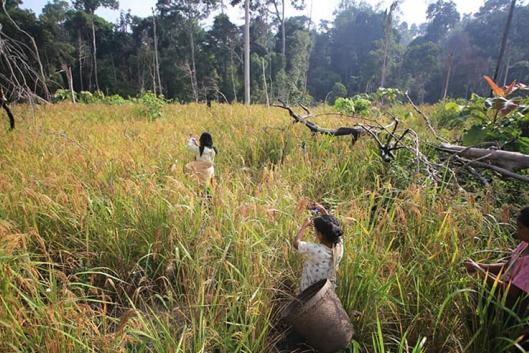The struggle in Geragai District
Up to 2011, a total of 18 companies had licenses over forest areas for a total of 663,809 ha distributed over 8 Regencies in Jambi Province, Sumatra, nearly 50% of which - 293,812 ha - is being controlled by one large corporation, PT. WiraKaryaSakti (PT. WKS), a subsidiary of Sinar Mas Group. The concession land of PT. WKS is divided in 5 Regencies, namely Tebo Regency, Batanghari Regency, Muaro Jambi Regency, TanjungJabung Barat Regency, and TanjungJabungTimur Regency.
In Geragai District, one of the Districts in East TanjungJabung Regency, PT. WKS received 2,467 ha under license in 2004, after the Ministry of Forestry identified the area as a cultivation land - usually called Areas for Other Usage, a category that refers to a non-forestry area turned into a Production Forest area.
The licensed area is adjacent to a Mangrove Protected Forest in the north of Pandang Sejahtera Village. PT. WKS did not establish any tree plantation there because of difficult access to the location so in 2007, communities from several villages took control over the unmanaged land and worked on it.They planted a variety of crops, such as banana, cassava, pumpkin, and vegetables and worked together building a road access and canals for drainage in order to facilitate access to the location.
In 2010,PT. WKS claimed that the land farmed by the community was its concession and started planting acacia on the land without respecting the presence of the communities, who have been using and working on the land long before the company came. To be able to control the land, the company shut the road access and the canals built by the communities, destroyed the communities’ crops and evicted the families who did community farming inside of it.
Until now, from the 2,467 ha land under concession PT. WKS have planted 1000 ha with acacia. The rest is still kept by the communities who have made several efforts to prevent the land from being taken by the company, e.g. protesting against Sinar Mas Forestry, sending a letter to PT. WKS, doing demonstration actions, conducting blockades, evicting the employees of PT. WKS at the maintained location and dismantling the camps of the company’s employees, as well as holding a dialogue process with the company, which is facilitated by the government of East TanjungJabung Regency.
The struggle in Batanghari Regency
Another case of resistance in Jambi Province takes place at Batanghari Regency. Crossed by the Batanghari River and enjoying a sub-tropical climate, the region has plenty of natural wealth and the land is very suitable for local food farming, i.e. paddy.
At the end of 2011, the Regent of Batanghari highlighted his “Self-Food-Sufficiency Program” which implied to open a rice field area, to provide fertilizer and seed for free, as well as the donation of farming equipment and machinery facility to every food farming group.
However, in mid-2012, the Regent issued a license for PT Inti Citra Agung (PT ICA) to establish an oil palm plantation in a concession area of 7,800 hectares. The area spreads in 9 villages in Mersam District, namely Sungai Puar Village, Sengkati Kecil Village, Sengkati Gedang Village, Teluk Melintang Village, Kembang Tanjung Village, Mersam Village, Rambutan Masam Village, Sungai Lais Village, and Benteng Rendah Village.
Mersam District is a paddy producing district and most inhabitants of those 9 villages are food farmers. Paddy farmers of Mersam Village think that if PT ICA is allowed to establish an oil palm plantation in their village the impact on the food and water resource area would be catastrophic.
The forest area also provides rattan for the community, which they process into various kinds of tools for their daily activities. “If the government wants Self-Food-Sufficiency in the form of rice, it has to revoke the license of PT ICA”, said members of the community of Mersam Village who reject PT ICA’s oil palm project. They fear that approximately 1,000 hectares of rice-field land would be damaged and lost if an oil palm plantation is established in their village.
The community of Mersam Village was also aware of the land conflicts caused by the oil palm plantation company in other villages: “Just look at Paseban Village. Since the oil palm plantation was established, the land is dry, so the farmers have to buy rice to eat. Industrial oil palm plantations, in fact, result in conflict”, utters Mr. Suhaimi, the Leader of Sungai Lais Farmers’ group, Mersam Village. “Therefore, it is better for us to defend our land ... Don’t let the company take it!” he concluded.
The rejection of the farmer community of Mersam is supported by the Parliament Member of Batanghari Regency as well as by several Non Government Organizations, i.e. Yayasan SETARA Jambi, Yayasan CAPPA-Ecological Justice, Perkumpulan Hijaudan Aliansi Gerakan Reforma Agraria (AGRA). “The granting of a license by Batanghari Regent to PT ICA is a conspiracy that will damage food farmers. Why wouldn’t the Regent listen to the society? Paddy is local food that grows and develops in harmony with the agrarian life of the farmers. Local farmers do not eat oil palm. Revoking the license of PT ICA that will damage the food land of the farmers is a final decision that must be made by the Regent”, said Nurbaya Zulhakim, an activist of Yayasan SETARA, who has been active assisting the food farmers of Mersam.
Together with several Non Governmental Organizations, the farmers’ society of Mersam will continue struggling to defend their food land, upholding their sovereignty on local food and rejecting the expansion of oil palm plantations into their village. The commemoration of World Food Day should be a momentum to support the local farmers, the village community, and grass root communities that firmly struggle for their land rights, their land sovereignty, and against the imposition of the global monoculture industry.
By Rivani Noor, CAPPA, e-mail: rivani@cappa.or.id
